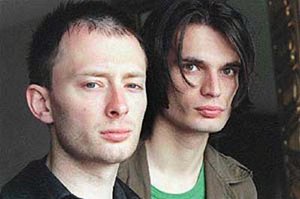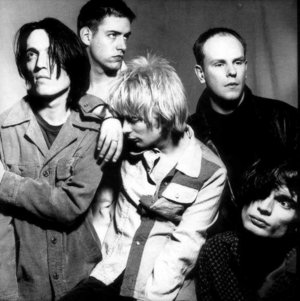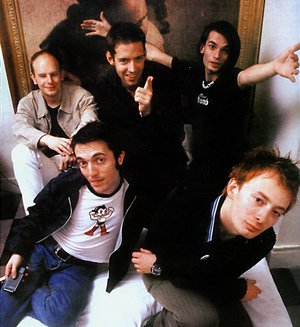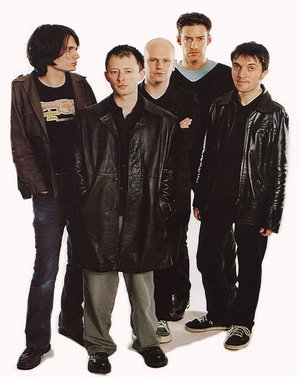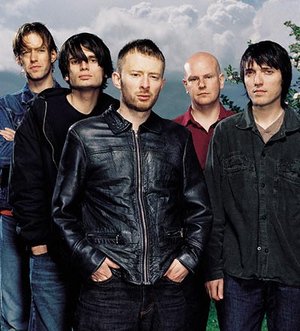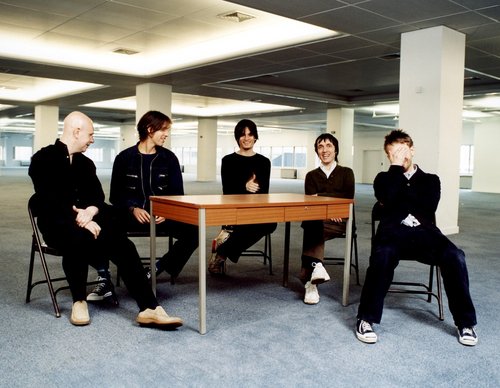Radiohead - Biography
Radiohead Biography
Radiohead is a British rock band from Oxford. Their current moniker, 'Radiohead', was taken from the song 'Radio Head' by Talking Heads, whose album Remain in Light (1980) is a band favorite and major influence on their Kid A (2000). The band consists of Thom Yorke (vocals, rhythm guitar and keyboards), Ed O'Brien (guitars, vocals), Jonny Greenwood (guitars, keyboards, Ondes Martenot, and other electronics), his brother Colin Greenwood (bass guitar), and Phil Selway (drums and percussion). Yorke and J. Greenwood are chiefly responsible for songwriting, most often with Yorke originating songs and Greenwood building on them. The band's early influences include artists such as Elvis Costello, the Pixies, Pink Floyd, R.E.M., U2, Talking Heads, The Beatles, The Smiths, and Mancunian post-punk acts The Fall, Joy Division, and Magazine. Later influences include German art-rock band Can, electronic artists such as Autechre, and jazz artists such as Charles Mingus and Miles Davis.
Producer Nigel Godrich has worked with the band since the recording of The Bends, where he assisted producer John Leckie, and has contributed significantly to their sound, often being dubbed the 'sixth member' of the band. Another major contributor is Stanley Donwood, who has produced the artwork for the band's albums since their My Iron Lung EP in collaboration with 'Dr. Tchock'—a pseudonym for Yorke. Donwood and Yorke met at the University of Exeter, and also produce the official band website, Radiohead.com (http://www.radiohead.com/).
While not normally considered Britpop, Radiohead's strong influence on Britpop bands such as Coldplay, Stereophonics, Muse and Travis, is undeniable. The Bends, released in 1995, has been particularly influential to the genre. With his usual wry wit, Thom commented on this: in 2001, when asked by The New Yorker, 'how do you guys feel about the fact that bands like Travis, Coldplay, and Muse are making a career sounding exactly like your records did in 1997?' he replied, 'good luck with Kid A.'
History
One hit wonders: Pablo Honey (1991–1993)
Radiohead formed during the late 1980s, originally under the name On A Friday, a name referring to the only time where all band members were able to practice. They first came to international attention in the early 1990s, when their single 'Creep' received extensive airplay and charted in many countries. Striking a highly popular and sympathetic note of similar self-loathing among fans, 'Creep' was released around the same time as other so-called 'slacker' anthems such as Beck's 'Loser'.
The band weren't unanimously keen on Creep and, until recently, refused to play it, believing that its meaning had been misinterpreted and given too much weight by fans. It was initially passed over, dismissed by Yorke as 'Jonny's Scott Walker song'. Legend says that Jonny's famous guitar crunches were supposedly an attempt to ruin a song he didn't like. 'Jonny played the piano at the end of the song and it was gorgeous' notes producer Paul Kolderie. 'Everyone who heard Creep just started going insane. So that's what got us the job doing the album.' The album was finished in three weeks. The single 'Creep' was released in September 1992, while the album was scheduled for February next year. Meanwhile, unbeknownst to the band, a radio station in San Fransisco, 'Live 105' had just named Pablo Honey its favourite record of the year and quickly crossed over onto L.A.'s KROQ and other West Coast stations. The single eventually peaked at a modest 34 in the US, but Pablo Honey went gold. A year after its original release, a reissued 'Creep' finally hit the UK charts, peaking at number 7. Because the album kept on breaking around the world, the Pablo Honey supporting tour lumbered into its second year. Pablo Honey was a solid, if unremarkable recording, that lacks both the force and experimentation of their later work. Regardless, their potential was evident with songs like the aforementioned 'Creep', 'Anyone Can Play Guitar', 'Thinking About You' and 'You'.
Breakthrough and rise to success: The Bends (1994–1995)
In 1995 it was time for their second record - the singificant and better one The Bends. It was unexpected and suprisingly more mature than their previous, considering the fact that they were marked as a one-hit-wonders after their debut. However the edifice marked 'follow-up to Creep' casted a long shadow over the sessions for their second album.
'It was either going to be Sulk, The Bends, Nice Dream or Just,' remembers producer John Leckie. 'We had to give those absolute attention, make the amazing, instant smash hits number 1 in America. Everyone was pulling their hair and saying, 'It's not good enough! We were trying too hard.'' The EP My Iron Lung (1994) was released between the two albums, and saw the band in a transitional stage between the poppy simplicity of Pablo Honey and the musical depth of their next album. The solution was a change of scenario: they quit the studio and toured Australasia and the Far East. 'It made them re-evaluate what they were good at and enjoyed doing,' claimed Hufford. 'Playing live again put the perspective back on what they'd lost in the studio.' Having worked the songs in on the road, they returned to Britain and completed the album in a fortnight.
Drawing heavily on 1960s influences as well as the then popular music exemplified by groups such as the Pixies and R.E.M., the album was a significant step forward for the group with Yorke's vocal style to the fore. Tracks such as 'Planet Telex', 'Street Spirit (fade out)' and 'Fake Plastic Trees' were striking, original and indicators of the group's subsequent developments. Although the album helped the band shake off the popular conception that they were 'one hit wonders', it wasn't until the fifth single, 'Street Spirit (fade out)', that the band would hit the top 10 again after 'Creep'. Although it was not a Britpop album at all, the record was associated with the movement and in early 1996—widely praised a year after the album's release—Radiohead took part in Cool Britannia, battling famous acts like Oasis, Blur, Pulp and Suede. Now, The Bends is considered by many critics and fans as one of the best albums of the mid-1990s.
At the height of their popularity: OK Computer (1996–1998)
Radiohead began writing OK Computer in early 1996 at their rehearsal studio, Canned Applause, a converted apple shed near their homes in Oxford, England. By July they had recorded four songs with producer Nigel Godrich. Having learnt from The Bends, they decided to break the songs in live before completing the record.
By July 1996, Canned Applause was set up for recording. It was the first time the band had attempted to cut album tracks outside of a conventional studio environment. Despite the experimental and unconventional setting, four songs from Canned Applause found their way onto the album. The songs were 'Subterranean Homesick Alien', 'Electioneering', 'The Tourist' and 'No Surprises'.
At July and August, they returned briefly for touring to present and try the new songs. In September they moved to St. Catherine's Court—a mansion owned by actress Jane Seymour—where they recorded the rest of OK Computer, without pressure. They made much use of the various different rooms and atmospheres throughout the house, and the isolation from the outside world encouraged time to run at a different pace, making working hours more flexible and spontaneous. A couple of songs—'Exit Music (for a film)' and 'Let Down'—were recorded live. By Christmas 1996, the album was finished, and in February and March was mixed. 'The biggest pressure was actually completing it,' remembers Ed O'Brien. 'We weren't given any deadlines and we had complete freedom to do what we wanted. We were delaying it because we were a bit frightened of actually finishing stuff.'
In 16 June 1997 OK Computer was released and received even greater acclaim than The Bends, featuring prominently in many 'best album' polls, then and now. It found Radiohead taking musical risks uncommon in the Britpop genre, experimenting with ambience and noise to create a set of songs that many consider to be a high point of late-twentieth century rock music. It received a Grammy Award for Best Alternative Album and was followed by their big 'Against Demons World Tour'. Grant Gee, the director of the 'No Surprises' video, accompanied the band on their tour and filmed it, which resulted in the 'on the fly' documentary Meeting People Is Easy.
Colin Greenwood said about the album: 'I think the overall mood on the record is starker than The Bends. I think that there is a consistent sound to 80 percent of the new album. I think we made things a little bit more extreme on this record. The important thing for us on this record was that we produce it ourselves. We had to learn how to make decisions amongst the six of us. There was the five people in the band and the engineer/mixer Nigel Godrich. We learned a lot from doing it on our own and in retrospect, we are very proud of this record.' The band released two EPs No Surprises/Running From Demons (1997) and Airbag/How Am I Driving?(1998), which differ only by a couple of songs. The more notable is the second, which has few songs that could best be described as a bridge between the progressive alternative rock of OK Computer and their subsequent experimental work.
OK Computer and Verve's sublime final effort - Urban Hymns - are regarded as a boost of the already dying Britpop movement, despite that both records departed from the style. Nevertheless OK Computer is regarded by some as one of the greatest rock albums and still tops peaks of various charts. It nailed Radiohead as top superstars and defined them as one of the greatest bands of 90s, threatening the leadership of seminal acts like R.E.M. and U2.
Experimental work: Kid A and Amnesiac (1999–2001)
Exhausted by their fame and on the verge of burnout following the OK Computer tour, the band spent the latter part of 1998 in relative quiet. They only appeared at the Amnesty International Concert in Paris (10 December 1998), and Thom Yorke and Jonny Greenwood performed at the Tibetan Freedom Concert in Amsterdam, where a new song, 'Pyramid Song', made its live debut.
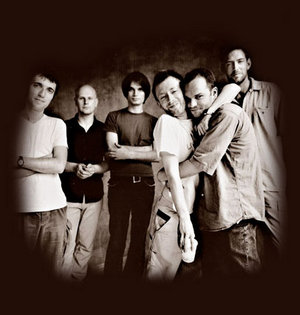
Thom Yorke admitted that after the tour the band was on the verge of splitting up. He also added that he fell in depression, but managed to recover with Michael Stipe's (R.E.M.'s singer) help. After O'Brien's collaboration for the BBC drama series 'Eureka Street', the band returned to the studio to record Kid A, a defiantly experimental album that complemented the lyrical and musical hooks of their earlier work with a more minimalist style.
Kid A was finished in April 2000 and with no singles, yet with promos, the album was promoted mainly on the Internet. This is where Radiohead's infamous relationship with Napster came into play. Three months prior to the release of Kid A MP3 tracks of the entire album made their way onto the file sharing service. As Richard Menta of MP3 Newswire detailed in his essay 'Did Napster Take Radiohead's New Album to Number 1?' millions of fans had possession of this music by the time the CD hit stores. The record industry assumed the album was now doomed to failure since fans already had the music for free. Instead the opposite happened and the band, which had never hit the US top 20 before, captured the number one spot in Kid A's debut week. With the record's absence of radio airplay, big time marketing, and any other factor that may have explained this stunning success, Menta declared this was proof of the promotional powers of file trading and of word-of-mouth generated by the Net.
Even Oasis' chief Noel Gallagher admitted that Kid A's great marketing scheme was its lack of any promotion: 'If you refuse to talk about your own album, that just stirs the pot and makes everyone else start talking about it.' While others agreed with Gallagher's assessment, it ignored any potential effect of Napster despite the fact it distributed Kid A to a huge number of music fans. Whatever the reason for the record's success on the charts, Kid A took the band from indie faves to burgeoning supergroup. The album's arrangements have been likened to a meeting of Pink Floyd and Aphex Twin. Kid A was released in October 2000. The band cited Alice Coltrane, Charles Mingus and Paul Lansky as influences, as well as the entire back catalogue of Warp Records. Kid A received Grammy Award for Best Alternative Album as its predecessor, which fired them to superstardom. Today, Kid A is considered by fans and critics as one of the greatest electronic albums made by a rock band and one of Radiohead's finest records.
The follow-up, Amnesiac, which was released in June of the following year, was comprised of further tracks from the same recording sessions as Kid A. Conceived as two separate sequences of songs, the two albums are similar in style and are linked by two different versions of the same song: 'Morning Bell.' While explaining the decision to release two albums rather than one, Thom illuminates his artistic intentions and further clarifies the relationship between Kid A and Amnesiac: 'They are separate because they cannot run in a straight line with each other. They cancel each other out as overall finished things. They come from two different places, I think ... In some weird way, I think Amnesiac gives another take on Kid A, a form of explanation.' He continues: 'Something traumatic is happening in Kid A, and this is looking back at it, trying to piece together what has happened. Go back and listen to Kid A after listening to Amnesiac, and I think you'll hear it.'
About the differences with the previous record he says: 'Kid A was kind of like an electric shock. Amnesiac is more about being in the woods, in the countryside. I think the artwork is the best way of explaining it. The artwork to Kid A was all in the distance. The fires were all going on the other side of the hill. With Amnesiac, you're actually in the forest while the fire's happening. With Kid A, when you sequenced certain tracks together, this play started appearing.' Indeed, while Kid A is a more soulful, melodic, and inviting record, albeit slightly dark, Amnesiac is instantly unsettling and more uncomfortable to the listener. Nevertheless the album was received very well and nearly reached Kid A's sales. While fans tend to like Kid A more than Amnesiac, the latter should be considered as the next successful and experimental chapter of their expedition in the musical world.
After the release of the album, the band staged their own mini-festival in Oxford's South Park, featuring Sigur Ros, Supergrass, Humphrey Lyttelton (who played trumpet on 'Life in a Glass House', the closing track on Amnesiac), and themselves. It was at this concert that the band finally played 'Creep,' after having refused to perform the song for many years. Initially the band wanted to release 'I Might Be Wrong' as their new single after 'Pyramid Song' and 'Knives Out', but soon the idea expanded into a full-fledged live record. In the fall of 2001, they released their first live album: I Might Be Wrong: Live Recordings, featuring performances from Berlin, Paris, London and a couple of other concerts and also including one unreleased track, 'True Love Waits'.
Mixing from everything: Hail to the Thief (2002–mid-2004)
The recording process for their next record, Hail to the Thief, was remarkably different from those for the previous three studio albums. Their sessions were more like the Bends, rather than the usual holing in a studio for months. The band elected to take their new material on the road in Portugal and Spain during July and August of 2002 prior to recording it. With the songs fleshed out and finalised during the tour, the band completed the album in a Los Angeles studio in a fortnight.
In 2003 the band released their sixth album, which was rooted in less overt experimentation than its two immediate predecessors but was still a long way from their earlier guitar-driven material. The album's title raised controversy in the U.S., being interpreted as a reference to the 2000 U.S. Presidential election. The band deny this claim. In the June 2003 issue of Spin Magazine, Thom Yorke was quoted as saying 'If the motivation for naming our album had been based solely on the U.S. election, I'd find that to be pretty shallow.' Instead, Yorke claimed that he had gotten the phrase from a radio program about the also controversial 1888 U.S. presidential election. That being said, he couldn't deny that the phrase 'Hail to the thief' was additionally used as an anti-Bush slogan by protestors at the end of the controversial 2000 election campaign that put him into the White House. On the day of his inauguration, Bush was greeted in Washington by thousands of protestors with banners, who shouted 'Hail to the thief, our commander in chief!'.
Two months before the album release, an unfinished version of the album was stolen, apparently from the recording studio where they were working, and uploaded to the internet. Unfortunately for them, the original album recordings also met the same fate, but the band remained adamant, didn't pull the album for an earlier date, and released it on the announced day: June 9, 2003. Even though the album was leaked, its sales overgrew those of their last two records both in its first week of release and overall. Hail to the Thief displayed influences from Radiohead's last three records, containing some electronic and ambient pieces and some new experimental sounds. It is generally considered to be a more guitar-based record than Kid A and Amnesiac. It was greeted warmly by both fans and the press. In contrast to the band's mood following the release of OK Computer, subsequent interviews and performances showed a band contented with themselves and their record: they were responding kindly to any interviews, while Yorke and his bandmembers were grinning and dancing on stages.
After that, Radiohead embarked on a huge international tour, which continued for about a year. It saw the band visiting Australia and Japan for the first time for more than 6 years, since their OK Computer tour in 1997–1998. Radiohead headlined the main (Pyramid) stage on the Saturday of the Glastonbury 2003, to huge crowd acclaim and positive press reviews. They omitted the traditional fan-pleasing 'Creep', to no-one's surprise. The same year, Jonny Greenwood, with the help of his brother fellow bandmember Colin Greenwood, recorded and produced the soundtrack Bodysong for the avant-garde documentary movie of the same name. One year after the release of Hail to the Thief, Radiohead released a new EP entitled COM LAG (2plus2isfive), while on their 2004 tour in Australia and Japan. With 11 tracks, COM LAG is longer than the average Radiohead EP. It features live takes, remixes, and different versions of Hail to the Thief-era songs, as well as a handful of acoustic and electronic numbers. The band finished touring and promoting Hail to the Thief in mid-2004 with an acclaimed performance at Coachella Festival.
Now and beyond (mid-2004–2005)
Jonny Greenwood became 'Composer in Residence' for the BBC, charged with creating modern classical pieces for the BBC Concert Orchestra. Other members of the band were also working on separate and solo projects. There were a few rumours and reports that Thom was working on solo project, and Phil Selway is involved with the Samaritans' Health organization. Recently, Jonny (on guitar) and Thom (on piano) combined their talents with Sir Paul McCartney (on bass) and Supergrass' Danny Goffey (on drums) for the Band Aid 20 project to commemorate the 20th anniversary of the original song, which featured stars like George Michael, Duran Duran and Phil Collins. It was released on November 29, 2004.
On 1 December 2004, the band released a new DVD. Thom Yorke said that this is a collection of songs, previously unreleased, that couldn't be found on the web or in Radiohead's entire back-catalogue. A new Radiohead book by Joseph Tate will be released in January, entitled The Music and Art of Radiohead. Some new work from Thom and Jonny will see the light, performed by the London Synfonietta at the Ether Festival in March. Phil and Jonny, along with Pulp frontman Jarvis Cocker will appear in the new Harry Potter movie, Harry Potter and the Goblet of Fire fall 2005, as the band 'Wyrd Sisters'. According to the site Barbican, Jonny will make a premiere in 23 April 2005, of his new work commissioned by BBC Radio 3, with music performed live by the BBC Concert Orchestra in London.
As for a new album, several members stated different things in 2004: Ed O'Brien mentioned that they just want to let the year pass on, before thinking on something new. May 2004 Colin Greenwood was quoted by Australian interview: 'We all have different agendas about what we want to do in Radiohead,' Greenwood said. 'I would like to see us try very different styles. I would like to see it go from acoustic to hard techno, with everything in the middle. But who knows? I would like to do something that captures our live energy as well.' Phil Selway said that the band will probably start recording their next record in 2005. He said in an interview for NME that such a marked change in direction with their next album as Kid A is unexpected. It is also rumoured that there is a Thom Yorke solo effort in the pipeline. However at February 2005 it was learned that organizers of the Field Day Music Festival for 2005, which rumoured to have Radiohead as headliners, had scrapped plans for a July concert at Greig Farm.
The official Radiohead site (http://www.radiohead.com) is particularly active in various promotions and updates, but whether this is indication of present projects of the band or they will deliver something in the nearby future behind fans' backs – it remains to be seen. Most fans think that Radiohead will resurface with new material not earlier than late 2005 or early-middle 2006. Considering various projects of band's members these dates are probable for a new Radiohead record.
Discography
Studio albums
| UK | US | (approximative genre overview) | |||
| Pablo Honey | (22 February 1993) | #22 | #32 | indie rock |
| The Bends | (13 March 1995) | #4 | #88 | alternative rock |
| OK Computer | (16 June 1997) | #1 | #21 | progressive rock |
| Kid A | (2 October 2000) | #1 | #1 | experimental ambient rock |
| Amnesiac | (4 June 2001) | #1 | #2 | experimental abstract rock w/jazz |
| Hail to the Thief | (9 June 2003) | #1 | #3 | electro progressive rock |
EPs
- Drill (1992)
- Itch (1993) - Japan Only
- My Iron Lung (1994) - Australian CD
- Live Au Forum (1995) - France Only
- The Bends Pinkpop (1996) - Dutch Single
- No Surprises/Running From Demons (1997) - Japan Only
- Airbag/How Am I Driving? (1998); #56 US (album chart) - US aimed release
- Amnesiac College EP (2001) - US College Radio
- I Might Be Wrong: Live Recordings (2001); #22 UK (album chart), #44 US (album chart)
- COM LAG (2plus2isfive) (2004); #37 UK (album chart) - Japan release
Singles
- 'Anyone Can Play Guitar' (1993); #32 UK
- 'Creep' (1993); #7 UK, #34 US
- 'Pop Is Dead' (1993); #42 UK
- 'Stop Whispering' (1993) *U.S. only
- 'The Bends' (1996)
- 'My Iron Lung' (1994); #24 UK
- 'Planet Telex/High & Dry' (1995); #17 UK, #78 US
- 'Fake Plastic Trees' (1995); #20 UK
- 'Just' (1995); #19 UK
- 'Street Spirit (Fade Out)' (1996); #5 UK
- 'Paranoid Android' (1997); #3 UK
- 'Karma Police' (1997); #8 UK
- 'No Surprises' (1998); #4 UK
- 'The National Anthem' (2000) (promo only)
- 'Pyramid Song' (2001); #5 UK
- 'Knives Out' (2001); #13 UK
- 'I Might Be Wrong' (2001) (promo only)
- 'There There.' (2003); #4 UK
- 'Go To Sleep.' (2003); #12 UK
- '2 + 2 = 5' (2003); #15 UK
VHS and DVDs
- Live at the Astoria (1995) VHS
- Seven Television Commercials (1997) VHS/DVD
- Meeting People Is Easy (1999) VHS/DVD
- 7 Television Commercials (August 5, 2003) DVD
- The Most Gigantic Lying Mouth Of All Time (December 1, 2004) DVD
Books
- Radiohead: An Illustrated Biography by Nick Johnstone (1997)
- Radiohead: From a Great Height by Jonathan Hale (1999)
- Radiohead: Hysterical and Useless by Martin Clarke (2000)
- Exit Music: The Radiohead Story by Mac Randall (2000)
- Radiohead: Back to Save the Universe: The Stories Behind Every Song by James Doheny (2002)
- Radiohead: A Visual Documentary by Tim Footman and Billy Dancer (2002)
- The Music and Art of Radiohead by Joseph Tate (2005)
Radiohead by others
Radiohead's music has inspired musicians from other disciplines, from string quartet to classical and jazz piano.
In September 1998, American jazz pianist Brad Mehldau included his version of Radiohead's 'Exit Music (For a Film)' on his album The Art Of The Trio, Vol. 3. In August 2002 he released the album Largo which featured Radiohead's 'Paranoid Android'. Both of these tracks are taken from OK Computer. The Anything Goes album, released February 2004, includes a re-working of the track 'Everything in its Right Place' from Radiohead's Kid A. All three albums were released by Warner Brothers.
The Section, a string quartet of violin, viola and cello, released two albums (on independent record label Vitamin Records) covering Radiohead: 2001's Strung Out On OK Computer is a track for track replica of OK Computer ; while 2003's Enigmatic draws mostly from Kid A and Amnesiac and a few tracks from The Bends.
In 2003 pianist Christopher O'Riley recorded True Love Waits, a collection of Radiohead tracks from various albums arranged for solo piano. It was published by Sony Music.
Similar bands
External links
- Radiohead.com (http://www.radiohead.com/) – The band's official website. The Messageboard has gathered a cult following. Members of the band occasionally post there.
- At Ease (http://www.ateaseweb.com/) – The largest fansite with detailed information on the band. Has an extremely popular message board.
- Green Plastic Radiohead (http://www.greenplastic.com) – Another Radiohead fan and news site.
- Monkey Picture Soundtrack (http://www.geocities.com/radiohead_lyrics/) – An independent transcription and analysis of Radiohead's lyrics, devoted to demystifying Yorke's unclear vocal deliveries.
- Pulk-Pull (http://pulk-pull.org/) – An on-going investigation of the band's music and art.
- Radiohead Unpackt (http://www.sas.upenn.edu/~adrivera/) – An in-depth interpretation of OK Computer, Kid A, and Amnesiac
- Rodeohead (http://www.hardnphirm.com/rodeohead.html) – A humorous Country & Western medley of Radiohead songs.
- Slowly Downward (http://www.slowlydownward.com) – Website of Stanley Donwood.
- Climbing Up The Walls (http://www.climbingupthewalls.com/) – A Radiohead fan site.
- Radiohead Lyrics (http://lyrics.rare-lyrics.com/R/Radiohead.html) – Unofficial collection of Radiohead lyrics.
- Radiohead-fans (http://www.radiohead-fans.org/) – Small Radiohead fansite.
- Did Napster Take Radiohead's New Album to Number 1? (http://www.mp3newswire.net/stories/2000/radiohead.html) - Article lays out the argument in favor of Napster's role in Kid A's sales success.
- Radiohead (http://www.allmusic.com/cg/amg.dll?P=amg&sql=11:wo8e4jo70wa4) at the All Music Guide
This biography is published under the GNU Licence

